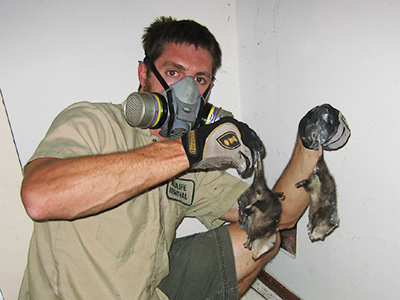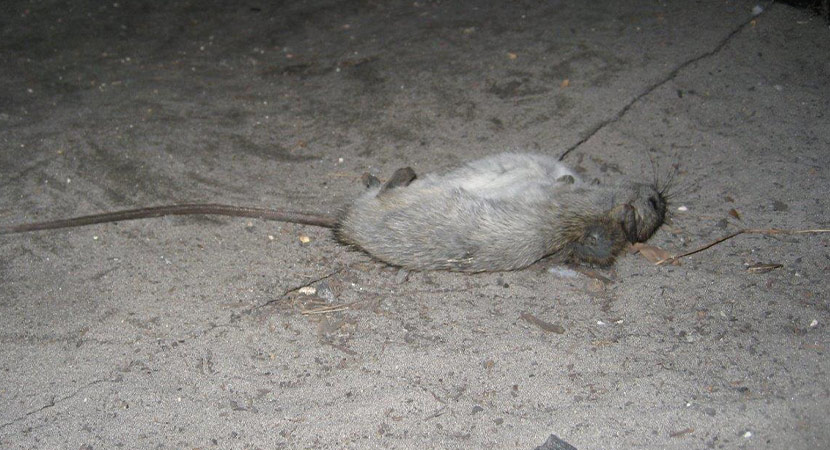Call me: 360-229-7965
Welcome to Olympia Dead Animal Removal! Got a terrible smell in your house, or do you see a dead critter on your property? We are an animal control company specializing in the removal of dead animals from your home, attic, basement, walls, yard, or any part of your property. You clearly don't want a dead animal in your house. Carcasses attract flies and give off terrible smells, not to mention the potential diseases rotting flesh can cause. Whenever we remove dead animals, we use 100% safe methods and make sure to disinfect your home and get rid of all traces of odor. Click here for Free Roadkill Removal and click here for Dead Pet Body Removal. For deceased wild animals in your home or property, call us anytime at 360-229-7965 to schedule an appointment for today! We come out fast! Some of the services we offer include:
- Dead Animal Removal
- Foul Odor Diagnosis
- Full Property Inspections
- House Damage Repairs
- Dead Body Location Services
- Proper Carcass Disposal
- Cleanup & Decontamination Services
- Deodorization Services
CALL US ANYTIME AT 360-229-7965

As wild animals lose their natural habitat, they will look for a warm and cozy place inside our house. Usually, they will also die there. It is just too impossible for us to stand the decaying scent of a dead animal. Your local animal department will only take dead animals in public places. If it is within your property, you have us as your dependable partner. Over the years of delivering outstanding services, we understand how necessary it is to get rid of the expired animal on time. If not, the risk of contamination, disease transmission, and pest infestation becomes higher. With our support, rest assured that you can reclaim your house from these animals. We are confident in delivering the highest standard of services, and we take our work seriously. We have made our services more affordable, allowing more people to have easy access to professional and top-notch services. We are also aware of the existing guidelines on the disposal of the carcass. Don't allow the presence of the dead animal to harm your family or your brands; you can easily prevent this by hiring our people. We will make sure that your situation will be taken care of efficiently and quickly. Call our local hotline today and let us show you how we can improve the quality of your life.
What Prices Do We Charge?
Learn about dead animal removal costs - each situation is different!
What if you found roadkill or a dead animal such as a deer in a public place, and you want the city or Thurston County services to remove it for free? Click here for Free Thurston County Dead Animal Removal services. What if a farm animal like a horse, or your beloved pet dog or pet cat has died and you need the body taken away? Click here for Dead Pet Body Removal.
We are experts in dead animal removal, and take our job seriously. When removing dead animals, we do a COMPLETE job — not only do we remove the dead animal from your home or yard, we also decontaminate the area, deodorize it, and dispose of the animal or cremate it. If you aren't sure whether the stench in your house is due to a rotting carcass or another reason, we can sniff it out with our noses from our years of experience. We remove dead raccoons, dead opossums, dead skunks, dead squirrels, dead birds, even dead dogs and cats. We frequently remove dead rodents from inside walls, because poison kills rats and mice, who die in your house. We completely solve your dead animal problem by taking these steps:
- Sniff out the dead animal if it is somewhere in your home
- When necessary, for example if the animal is in a wall or under your house, cut a hole to remove the animal
- Remove the dead animal, safely and completely (and seal the hole if needed)
- Finish the job by decontaminating and deodorizing your home
- Properly dispose of the dead animal through incineration or other means
- Prevent it from happening again by finding out how they got in your house
Dead animal carcass removal is specialty work. Sometimes the job is simple, such as a dead opossum in the yard, in which case we can simply wear our gloves and respirator mask, bag the carcass, and take it away for incineration. Sometimes this is more complex, such as when the dead animal is under a home crawlspace, under a porch or deck or shed. Or if the animal is larger, such as a dog or a deer. The most complex cases are dead animals inside the house. The animal may have died inside the attic, or down in the walls, or the duct work, or any other part of the architecture. You may have a bad smell in your home, and you're not even sure what's causing it. We've removed not just dead animals, but rotting food, bad mold, etc. We specialize in locating the source of the smell, and we very commonly cut a hole in the ceiling or wall to remove the animal. We remove every bit of the carcass, mop up the juices, vacuum the maggots, spray it and wipe it down with disinfectant, cleaner, and we repair the hole we cut. In some cases we use ozone machines to neutralize odor.
Olympia Dead Animal Tip: Life Cycle of Fly on a Dead Carcass

In general, you would think that after you have taken care of a rat infestation, either by poison or traps, you won’t have to handle anything else. However, contrary to popular belief, after eating poison, most mice and rats don’t head out of your house in search of water; they are more likely to crawl to the edge of your attic and quietly die, leaving a lingering smell in your home, and opening it up to uninvited guests: the common fly.
Flies generally breed and feast on dead animals, and are more likely to invade the rest of your home after they have had a hearty incubation period inside of any dead rodents that might be hiding in your attic or crawl spaces of your home. Within a few weeks, these flies can take over your home, causing a bigger issue than the original rodent was in the first place.
Most of the time, the life span from a maggot to a fully-grown blow fly can be anywhere from twenty days to one month, depending on many factors, including the species. If not taken care of quickly, though, these flies can multiply at incredible rates- the female blowfly can lay up to three hundred eggs at a time. This can spell trouble when there are dead rats or mice in your home, as these numbers can grow immensely within a short amount of time, with a few thousand breeding on a small piece of flesh within twenty-four hours.
When there are dead mice or rats inside your walls, driven there to die quietly after eating poison, the question is no longer if there will be flies, but when. Generally, a mouse will take about a week to decompose naturally inside your house, and, in that time, will become a breeding ground for flies that come to feast on it. The ‘blow fly’ is the most typical kind of fly that will be attracted to these rodents, using its body to bury its eggs and incubate the next group of flies to take over your house.
Within short order, the hundreds of eggs will hatch into maggots, with pale, fat bodies and hook-like mouths, perfect for nourishing themselves off the meat of the rodent. These blow flies will eat away at the mouse for roughly a day before they emerge as pupae, developing a hard, protective shell that we associate with fully grown flies. After five days, they will then turn again into mature blow flies, noticeable by their dark, metallic color.
Finally, the blow flies emerge as a fully-grown fly, nurtured by the dead animal that they have nourished themselves on, they have a month to sneak into your home itself and keep their cycle going- breeding more flies in the process.
Flies are a problem that will arise shortly after taking care of an animal infestation, but is easily remedied as well. These remedies can be found in your local supermarket, often cheaply, and can range from a good-old-fashioned fly swatter to fly paper that you can hang around your home. The most important way to take care of flies, though, is generally to eliminate the source: finding the carcass that they are breeding on, and removing it.
We service nearby towns such as Olympia, Lacey, Tumwater, Yelm, Nisqually Indian Community, Rochester, Tenino, Rainier, Grand Mound, Bucoda, Tanglewilde, North Yelm,.